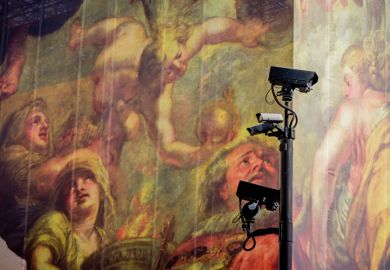Faculty are tired of technology. Or, rather, all the technology they have to juggle is making them tired.
According to a new survey of faculty in WGU Lab’s College Innovation Network, 77 per cent of faculty respondents – all US-based – feel they are “always on the job because of technology”, and 67 per cent agree that there are days when they do not want to use technology because they need a break from it.
These survey results came in just before the broad launch of ChatGPT, Bard and other generative AI tools sent shockwaves through higher education. It is fair to project that the stress of tech has only got worse for faculty since then.
Paradoxically, the vast majority of faculty surveyed see the value in edtech and envision an increasingly digital future for higher education. Eighty-three per cent said edtech enhanced teaching and learning experiences, and 86 per cent said they expected its use in class to increase.
So what’s causing the disconnect?
It is common to scapegoat a proliferation of uncoordinated and clunky tools on campuses. This is certainly part of the problem. There are a lot of applications being used and faculty don’t feel well supported to use them. In the first edition of our Faculty EdTech survey, 30 per cent of faculty reported dissatisfaction with the available time they have to learn how to use and implement new edtech in their courses, rising to 44 per cent at four-year colleges.
Our survey, however, points to deeper and more complex concerns about trust, decision-making, lack of control and professional purpose, which need serious attention from both vendors and institutional administrators.
First, faculty don’t trust the edtech market or the administrators making tech-adoption decisions. Few faculty trust the information coming from vendors and place little stock in studies about product effectiveness. They would feel more comfortable adopting the technology if they saw evidence that it was working at peer institutions.
Edtech companies put little effort into truly understanding the teaching and learning context in which their products will be used. They often fail to articulate what problem their tool will help to solve, and they offer few case studies that demonstrate how busy faculty have used tools in their practice. They also provide too few resources and training to support practice.
Institutions might sign the contracts, but faculty will determine whether tools are used, so edtech companies need to prioritise the information faculty are looking for, and that is information about practice.
Neither do faculty feel heard in purchasing decisions. Whether it is learning-management software, discussion board tools or calendaring systems, faculty and students are the primary edtech users in an institution, yet 87 per cent of faculty in our survey reported that college administrators – those furthest from the classroom – have the most influence in edtech decisions, with students and faculty having the least. Unsurprisingly, then, only 30 per cent of respondents trust their institution to choose the right products and, when asked who should have the greatest influence on EdTech decisions, faculty said they should.
No one wants another steering committee, but edtech does need to be usable and useful to faculty. Faculty members (and, arguably, students as well) should be brought into user-testing phases and included in the process for adding new features to a product roadmap. Institutions should also embrace a holistic adoption through an implementation plan that starts with an understanding of the teaching environment. What other tools are faculty already using? How are learners and educators using this technology currently? How much time will it take to train faculty on the new tools and what is the feedback loop to evaluate their effectiveness? If faculty know they’re part of the decision-making, they’ll be less inclined to disengage with the evolution of new tech tools.
Faculty are particularly wary of a tech-enabled future that is more standardised and less interactive. More than half of those surveyed said they worried that edtech would decrease the autonomy they now had to design their own courses, and almost half agreed it could lead to less engagement with students. Many faculty equate tech-enabled learning with canned videos of lectures and bot-driven tutors, rather than tools that will help them radically personalise engagement with the course material and free their time to guide students in the way only caring and thoughtful educators can.
These issues go right to the heart of teaching practice, so the concerns are inevitably distressing. If campuses don’t start actively planning their future, faculty are going to worry about a future that simply happens to them. Faculty are letting us know that they don’t feel like they have control over how technology is shaping and changing the work – and a feeling of lack of control can often lead to burnout.
There’s little question that edtech can deliver on its promise of providing students and faculty more flexibility and expanding access to higher education among historically overlooked learners. AI technologies will give us the power to personalise at scale in ways we only dreamed of a decade ago. But if we don’t give serious attention to addressing faculty’s concerns, we risk losing the very people we most need in order to make technology effective in learning.
Betheny Gross is research director at WGU Labs, an edtech accelerator company based in Utah that is affiliated to Western Governors University, a private non-profit online university
Register to continue
Why register?
- Registration is free and only takes a moment
- Once registered, you can read 3 articles a month
- Sign up for our newsletter
Subscribe
Or subscribe for unlimited access to:
- Unlimited access to news, views, insights & reviews
- Digital editions
- Digital access to THE’s university and college rankings analysis
Already registered or a current subscriber? Login








